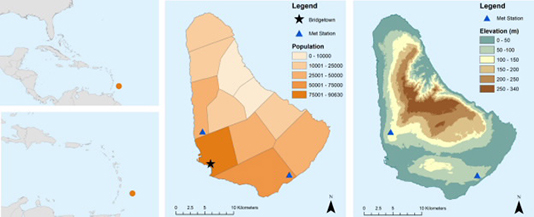July 17, 2018 (Source: UF) - Medical Geography researchers from the University of Florida recently participated in a study that successfully predicted dengue fever outbreaks on the Caribbean island of Barbados, using climate data. This paper is part of a special issue of PLOS MEDICINE, focusing on the impacts of climate change on health, and is a result of an unprecedented collaborative project, funded by USAID to address climate driven health impacts in the Caribbean.
The study, led by Dr. Rachel Lowe from the London School of Hygiene and Tropical Medicine, tested whether dengue outbreaks in the Caribbean island of Barbados could be predicted using weather station data for temperature and a precipitation index (Standardized Precipitation Index- SPI) used to monitor drought and extreme rainfall. Using data from June 1999 to May 2016, researchers found that the statistical model was able to successfully predict months with dengue outbreaks versus non-outbreaks in most years. Dengue fever is spread by Aedes sp. mosquitos and infects over 350 million people each year, resulting in 25,000 deaths globally and costing households, governments, and businesses over $45 million annually. In recent decades, the disease has emerged as a major public health threat, and as many as 2 in 5 people globally are at risk of contracting dengue fever.
|
Image credit: Ms. Catherine Lippi. This study was conducted with epidemiological data collected in Barbados, an island located in the Caribbean (left). Population in Barbados (middle) and elevation on the island (right) are shown, as well as the location of the two meteorological stations that provided climate data for the study. |
UF Medical Geography professor Dr. Sadie Ryan and doctoral student Ms. Catherine Lippi collaborated on models that explored the delayed effect of climate indicators like extreme rainfall and drought on future outbreaks of dengue fever on the Caribbean island. “This study highlights the importance of keeping long term records of climate and health data so that we can learn about how a changing climate will impact our health and well-being in the future,” said Dr. Ryan.
The model found a sharp increase in disease transmission one to two months after extreme rainfall events, but a surprising result of the model was an increase in infections four to five months after a drought event. Lippi explained "During droughts, people store water in containers near their homes," she said, "which creates the perfect habitat for Aedes mosquitos." Senior author, Dr Stewart-Ibarra, from SUNY Upstate Medical University said she and others working on the project had heard from locals that this was a recurring trend but it wasn’t until they studied the data that they found it to be true. “Barbados is a water-scarce country. During periods of drought, people have to store water.”
The findings have been published in a paper titled Nonlinear and delayed impacts of climate on dengue risk in Barbados: A modelling study in PLOS Medicine.
The study was part of a collaboration between UF and the Caribbean Agency for Public Health, the Pan American Health Organization, the Caribbean Institute for Meteorology and Hydrology, as well as investigators from the London School of Hygiene and Tropical Medicine, SUNY Upstate Medical University, and the Escuela Superior Politecnica del Litoral of Ecuador.












